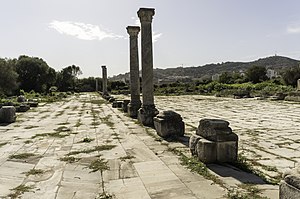| This article relies largely or entirely on a single source. Relevant discussion may be found on the talk page. Please help improve this article by introducing citations to additional sources. Find sources: "Siege of Hippo Regius" – news · newspapers · books · scholar · JSTOR (November 2019) |
| Siege of Hippo Regius | |||||||
|---|---|---|---|---|---|---|---|
| Part of the Vandalic conquest of Africa Fall of the Roman Empire and Roman–Germanic Wars | |||||||
 Ruins of Hippo Regius | |||||||
| |||||||
| Belligerents | |||||||
| Vandals | Western Roman Empire | ||||||
| Commanders and leaders | |||||||
| Genseric | Boniface | ||||||
| Strength | |||||||
| Around 15,000–20,000 fighting men | Less than 20,000 | ||||||
| Casualties and losses | |||||||
| Unknown | Unknown | ||||||
The siege of Hippo Regius was a siege from June 430 to August 431, carried out by the Vandals under their king Gaiseric against Roman defenders under Boniface, Count of Africa.
Background
Boniface, freshly reconciled with imperial power in Rome, sought to oppose the advance of the Vandals in North Africa. After peace talks broke down, he confronted them militarily in the spring of 430, but was defeated. He then retreated with his federated Gothic troops to Hippo Regius, a fortified city occupying a strategic position. The city had by then already welcomed several thousand refugees from the surrounding provinces, including one of the main sources on this event, Bishop Possidius of Calama.
Siege
The siege begins in May or June 430. While the bulk of the Vandal army imposed a land and sea blockade, detachments plundered the surrounding province. After 14 months, however, Gaiseric was the one short on supplies. The Vandals lifted the siege, making the ordeal a technical Roman victory. However, Boniface quickly abandoned the city by sea to meet with reinforcements from the eastern empire; the Vandals were able to occupy the town and subsequently defeated the combined Roman forces in a set battle.
Among those who died during the siege was St. Augustine.
References
- Hughes, Ian. "Aetius: Attila's Nemesis." Pen & Sword, 2012. ISBN 1848842791. p.81
- Wijnendaele, Jeroen W. P. The Last of the Romans: Bonifatius - Warlord and Comes Africae. New York: Bloomsbury Academic, 2016. p.90
- ^ Hughes, Ian (2017). Gaiseric: The Vandal who destroyed Rome. Pen & Sword Military. pp. 78–80.
- Thomas Benfield Harbottle, DICTIONARY OF BATTLES - From the earliest date to the present time, p. 13.
This Algerian history-related article is a stub. You can help Misplaced Pages by expanding it. |